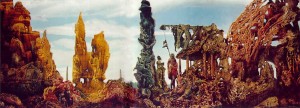 Europe After Rain II, the painting by Max Ernst on which the title of Book One of V for Vendetta is based. There is an obvious connection between the two of nuclear destruction.
Europe After Rain II, the painting by Max Ernst on which the title of Book One of V for Vendetta is based. There is an obvious connection between the two of nuclear destruction.
I’ll start by saying that until this point, I had never read a comic beyond what is found in the Sunday newspaper. V for Vendetta smashed every perception I had of comics to pieces and I loved every minute of it. So much about this comic book I loved. The storyline had me turning pages almost faster than I could read them and I found myself gasping when something unexpected happened. Then there would be a more artistic rather than action based sequence, that to me reminded me of an avant garde film, where the choices are unique and the frames don’t always match up. The unique combination of picture and words had an effect on me that I think neither would have had on their own. My praise aside, I do have some interesting thoughts that came into my head as I read and reflected on this work.
As of now, I’m not entirely sure what to think about V. It is mentioned in the novel that he is a terrorist. And yes, his actions do seem to match this title. However, is it considered terrorism if it is against a corrupt government? Well I think that certainly is dependent on through which lens you look. We then get into questions of what is considered corrupt which brings about a whole lot of ethical considerations. I feel when one may dive into the nitty gritty of terrorism, they may find that different groups may justify their actions in this gray area of what is corrupt. Of course I speak of all this in the most speculative way, as I do not know or understand the functioning and relations of terrorism.
It is certainly apparent in this story that the government, the Norsefire party, is corrupt. The use of concentration camps to exterminate enemies, governing by force, controlled media, and monitoring are just some of the questionable actions. Even the names of government departments (i.e. The Eye, The Ear) are intimidating and describe questionable intentions. However, this happens, and is happening, whether to the full extent or a modified extent outside of the fictional world. The Norsefire party has obvious parallels to the Nazi party (concentration camps, medical experimentation, and a governing police force are some among many). I would argue that this is the fullest example on which the Norsefire party is based. But even in modern day, these properties may be apparent in lesser extremes. For example, it is theorized that the US government monitors phone calls. Censorship in media has also occurred throughout history. While the manifestation may not be as extreme as is observed in V for Vendetta, it is still has some factual basis.
I guess I would conclude that the character of V is a terrorist. However, the framing of the narrative diminishes his terrorist actions, and V himself justifies most of the time as he explains them to Evey. This makes the reader want to root for V, which isn’t hard to do as the corruption of the government is obvious. But still, does this justify V’s actions? That I’m not entirely sure of, but it certainly makes V one of the most interesting characters that I’ve ever encountered.